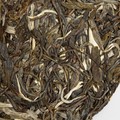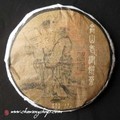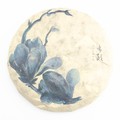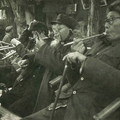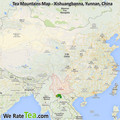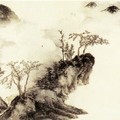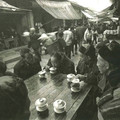Bulang - China - 5 stars
Tea by type
Tea by region
Tea by years and other
Lao ManE 2013 autumn
 1 review
1 reviewThe LaoManE rules over this autumn teas. In this village you may find really bitter tea and also sweet teas as the villagers call it. This one is something from the first and second too, very balanced and drinkable from it's very fresh state. Masterly picked and made maocha makes a great tea, made by a very skillfull and modest buddhist monk. A tea that comes with its sharp edge, a fruity center and very well defined taste.
2013 Chawangpu "Lao Yu" Xiao Bing Cha 200g
 1 review, 2 comments
1 review, 2 commentsLao Yu (老妪) : old woman Material for this cake came from a small Bulang village in Bada mountain. This village have very small quantity of tea trees that grow in the forest. Trees are relative old, but farmers cut the branches when trees get too tall. Tea trees are kept at easy-picking height because the tea is picked and made by old women in this village. They follow ancient ways to produce tea. Many of them make tea only for themself. We selected and bought good...
2012 EoT Bulang Puer Tea 400g
 1 review, 1 comment
1 review, 1 commentThis tea was a bit of an experiment for us. We'd found 2 different maochas from Bulang mountain, which were each excellent, but in different ways. One was old trees from around Manmu village, while the other was old trees from a few km away. We went back and forth, trying to choose one of them to press into cakes, and in the end decided to blend the two teas. The Manmu was very pure in flavour with a strong qi and strong ku (pleasant bitterness), the other was thicker in the mouth and more...
Theme
Quotes
„Dreaming of the Tiger Spring. The water from the spring itself seeps out from quartzite and is regarded as among the finest in China.The water is popular for brewing teas, such as the local specialty, Longjing tea.“
Latest posts
01.01.2016 @ 18:14:35 - Eternal Spring:
WeRateTea.com wish you all the best for 2016!...
07.12.2015 @ 09:07:02 - sypalino:
I decided to taste this tea 2 weeks after delivery. The cake is lightly pressed, so...
09.11.2015 @ 21:58:19 - Eternal Spring:
Comparison of 2013 Bada Pu-erh.sk with <a...
09.11.2015 @ 09:34:07 - Eternal Spring:
Lao Yu 2013 is now about 2,5 years old tea and out of this 1,5 year stored in Europe....
09.11.2015 @ 09:33:11 - Eternal Spring:
Comparison of all three Lao Yu is now done :)
15.10.2015 @ 11:06:37 - Eternal Spring:
2015 Chawangpu Collection – I can only tell, that all teas are very good :)
09.10.2015 @ 10:31:19 - Eternal Spring:
It was quite long and difficult tasting to make a decision… There is still quite...
24.01.2015 @ 16:55:57 - Eternal Spring:
WeRateTea.com wish you all the best for 2015!...
30.12.2014 @ 17:19:22 - Eternal Spring:
"FT(For Taiwan)" means this brick was a special order of "Fei Tai" Company. Fei Tai...
13.08.2014 @ 18:24:28 - Eternal Spring:
We compared two teas from Youle. 2005 Jinuo Shan You Le "Red Sun Drum" and 2009...
Tea by region
We will help you with tea selection.
Do you like quality loose tea?
We will help you to find the right one for you. Be inspired by tea ratings of other tea lovers. Rating stars could help you.


Review your cup of tea.
Review the tea you are drinking and help other tea lovers to find the right cup of tea.






 Shops
Shops
